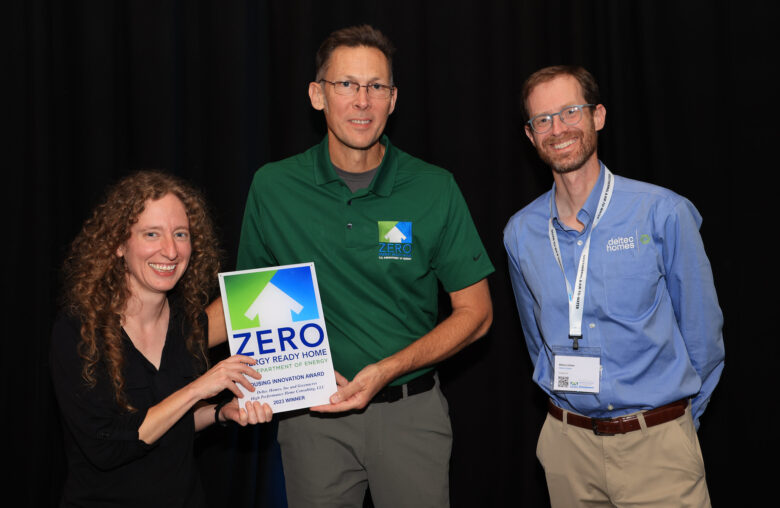Last week, two members of Deltec’s leadership team attended the 2023 Energy and Environmental Builders Alliance (EEBA) Summit in Salt Lake City, Utah. Builders from all over the US with a focus on environmentally responsible building methods gather at this event each year to share knowledge and resources.
Our Head of Sustainable Technologies, Leigha Dickens, presented on a panel with four other builders who each use different types of “offsite construction” methods, plus a Pacific Northwest National Labs researcher who collects data on certified Zero Energy Ready Homes. The latter had put together interesting research showing that projects utilizing offsite construction techniques often have better air-tightness scores and better HERS scores than homes in the program that use stick framing alone–a topic that she and Leigha have presented about before.
This panel consisted of four building companies, each with a very different business model, yet all using structural components built in a factory. Longtime followers of Deltec might know that we started out as a panelized kit manufacturer back in the 70s, building our unique round homes and selling them to customers all over the country. But the use of panelized components is not unique to Deltec, and is indeed a growing trend in the industry overall. Leigha spoke on a panel with a production builder based in Delaware who purchases pre-built wall panels for all their single and multi-family projects, a SIPS builder based in NC, and a startup modular home manufacturer that builds exclusively to Zero Energy Ready Home standards. No matter the business model, all had found that factory pre-fabrication helps them to deliver a high quality product.
Leigha also presented on a panel on women in construction, highlighting the need to get more women into the industry at all levels and sharing insights on how to succeed as a woman in a still very male-dominated field.
And of course, the highlight of the week was receiving Deltec’s third Housing Innovation Award from the US Department of Energy for a Ridgeline project recently completed in Ohio. (View case studies on this home and our other past Housing Innovation Award winning homes.)
Other notes from the EEBA Conference:
- The competition for the Housing Innovation Awards was very impressive this year, with ground-breaking projects across the US looking at things like interconnected community energy management, embodied carbon accounting of the materials in the home, fire resilience, and more. We were happy to see our home state of North Carolina well represented with three winners, two from Asheville.
- Manufacturing concrete is a huge source of greenhouse gas emissions, yet concrete remains a necessary building material. One presentation estimated the impact of the manufacture of concrete at 8% of global carbon emissions–but also posited that reducing concrete by 3% could make a significant impact on the world’s progress towards Paris climate goals. There are ways that individual customers can reduce the concrete content of their projects, such as looking into concrete with higher fly ash content.
- Water availability remains a growing challenges for builders in the Western US, especially amid a changing climate. Deltec picked up some leads on some simple water-saving technologies that clients might be able to implement into their homes, such as Rainstick and Hydraloop.
- Resilient buildings benefit all of society. Recent work by the National Institute of Building Sciences found that for every $1 spent to build new buildings to current resiliency codes, $11 is saved. Deltec provides structures to meet and often exceed local energy and wind codes.
